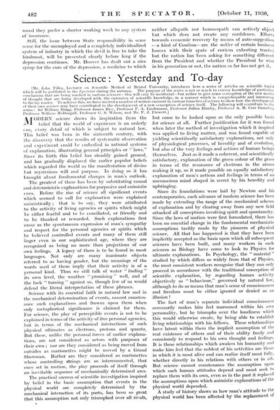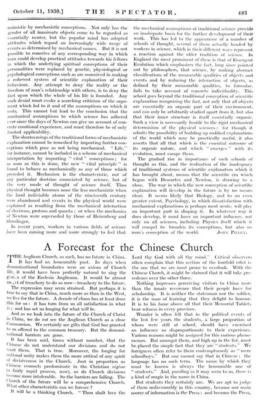Science : Yesterday and To-day [Mr. John Piney, Lecturer on
Scientific Method at Bristol *University, introduces here a series of articles on scientific topics .thich will he published in the Spectator during the autumn. The purpose of the series is not no much to convey knowledge of particular conclusions that are being reached in various sciences—this will only be incidental—but rather to give some conception of the new modes of thought that are being developed with the extension of scientific knowledge, in a manner which is comprehensible and interesting to the lay reader. To achieve this, we have invited a number of writers eminent in various branches of science to show how the development of their own science may have contributed to the development of a new conception of science itself. The following will contribute to tlis series Sir William Bragg, Professor James Rice, Professor F. A. Lindemann, Professor Julian Huxley, Professor A. IC Carr Saunders, Professor William McDougall, Professor Cl. S. Wilson, and Mr. F. J. Prewett.] ODERN science draws its inspiration from the -0-1- belief that the world of experience is an orderly cite, every detail of which is subject to natural law.
This belief was born in the sixteenth century, with the discovery that the results of systematic observation and experiment could be embodied in rational systems of explanation, illustrating general principles or "laws." Since its birth this belief has steadily gained ground, and has gradually displaced the earlier popular beliefs which regarded the world as the manifestation of divine but mysterious will and purpose. In doing so it has brought about fundamental changes in man's outlook.
The greatest of these has been by substituting causal and deterministic explanations for purposive and animistic ones. Before the rise of science all significant events which seemed to call for explanation were explained animistically ; that is to say, they were attributed to the activity of living agencies or spirits which might be either fearful and to be conciliated, or friendly and to be thanked or rewarded. Such explanations first arose as the spontaneous expression of man's sympathy and respect for the personal agencies or spirits which he believed controlled events and many of them still linger even in our sophisticated age, where they are recognized as being no more than projections of our own feelings. A legacy of them is to be found in most languages. Not only are many inanimate objects referred to as having gender, but the meanings of the words used of them imply that their activity is of a personal kind. Thus we still talk of water " finding " its own level, the weather " promising " well, and of the luck " turning " against us, though few of us would defend the literal interpretation of these phrases.
Science with its essential faith in natural law and in the mechanical determination of events, cannot counten- ance such explanations and frowns upon them when only metaphorical significance is claimed for them. For science, the play of perceptible events is not to be explained in terms of the activity of free personal agencies, but in terms of the mechanical interactions of such physical ultimates as electrons, protons and quanta. But these, unlike the personal forces of earlier explana- tions, are not considered as actors with purposes of their own ; nor arc they considered as being moved from outsides as marionettes might be moved by a Grand Showman. Rather are they considered as marionettes whose controlling strings are so 'interconnected, that once set in motion, the play proceeds of itself through an inevitable sequence of mechanically determined arcs.
The practical success of scientific investigation inspired by belief in the basic assumption that events in the physical world are completely determined by the mechanical interaction of its parts, has been so grad that this assumption not only triumphed over all rivals, but came to be looked upon as the only possible basis for science at all. Further justification for it -was found when later the method of investigation which it inspired was applied to living matter, and was found capable of yielding scientifically satisfactory explanations, not only of physiological processes, of heredity and of evolution, but also of the very feelings and actions of human beings themselves. Just as it made a coherent, and scientifically satisfactory, explanation of the green colour of the grass in terms of the resonance of electrons in the atoms making it up, so it made possible an equally satisfactory explanation of men's actions and feelings in terms of an Unconscious mind shaped in secret by his heredity and upbringing.
Since its foundations were laid by Newton and his contemporaries, each advance of modern science has been made by extending the range of the mechanical scheme of explanation and by clearing away from any new field attacked all conceptions involving spirit and spontaneity. Since the laws of motion were first formulated, there has been no essential change in the fundamental mechanistic assumptions tacitly made by the pioneers of physical science. All that has happened is that they have been implicitly accepted as the basis upon which all subsequent sciences have been built, and many workers in such sciences as Biology have come to look to Physics for ultimate explanations. In Psychology, the " material " studied by which differs so widely from that of Physics, the most consistent workers recognize that they can only proceed in accordance with the traditional conception of scientific explanation, by regarding human activity objectively as "behaviour," governed by natural law, although to do so means that man's sense of consciousness and -freedom must be either ignored or denied as an illusion!
The fact of man's separate individual consciousness necessarily makes him feel marooned within his own personality, but he triumphs over the loneliness which this would otherwise create, by being able to establish living relationships with his fellows. These relationships have latent within them the implicit assumption of the real existence of others and of their ability freely and consciously to respond to his own thought and feelings. It is these relationships which awaken his humanity and make him feel that the noblest of his activities are those in which it is most alive and can realize itself most fully, whether directly in his relations with others or in art. But ' science cannot countenance the assumption upon which such human attitudes depend and must seek to replace them with its own, even as in the Past it replaced the asstimptions upon which animistic explanations of the physical world depended. A study of history shows us how man's attitude to the physical world' has been affected- by the replaceffient of animistic by mechanistic conceptions. Not only has the gender of all inanimate objects come to be regarded as essentially neuter, but the popular mind has adopted attitudes which regard an increasingly wide range of events as determined by mechanical causes. But it is not possible to conceive of any corresponding way in which man could develop practical attitudes towards his fellows in which the underlying spiritual conceptions of their personalities were replaced by genetic, physiological or psychological conceptions such as are conceived in making a coherent system of scientific explanation of their behaviour. Any attempt to deny the reality or the freedom of man's relationship with others, is to deny the fact upon which the whole of his life is founded. Any such denial must evoke a searching criticism of the argu- ment which led to it and of the assumptions on which it rests. This cannot but lead to the conclusion that the mechanical assumptions to which science has adhered o'er since the days of Newton can give no account of con- crete emotional experience, and must therefore be of only limited applicability.
The shortcomings of the traditional forms of mechanistic explanation cannot be remedied by importing further con- ceptions which pose as not being mechanical. "Life," for instance, cannot be included in a scheme of mechanical interpretation by importing " vital " conceptions ; for as soon as this is done, the new " vital principle" is found to behave as mechanically as any of those which preceded it. Mechanism is the characteristic, not of any particular doctrine enunciated by science, but of the very mode of thought of science itself. Thus physical thought becomes none the less mechanistic when the hard indivisible atoms of the nineteenth century were abandoned and events in the physical world were explained as resulting from the mechanical interaction of electrons, protons and quanta ; or when the mechanics of Newton were superseded by those of Heisenberg and Shrodinger.
In recent years, workers in various fields of science have been coming more and more strongly to feel that
the mechanical asstunptions of traditional science provide an inadequate basis for the further development of their work. This has led to the appearance of a number of schools of thought, several of them actually headed by workers in science, which in their different ways represent a reaction against the older tradition of science. In England the most prominent of these is that of Emergent Evolution which emphasizes the fact, long since pointed out by philosophers, that science, by making abstract classifications of the measurable qualities of objects and events and by reducing the interaction of objects, as defined by their measurable qualities, to formulae, fails to take account of concrete individuality. This school goes beyond the traditional conception of scientific explanation recognizing the fact, not only that all objects are essentially an organic part of their environment, and can only be arbitrarily studied apart from it, but also that their inner structure is itself essentially organic. Such a view is necessarily hostile to the rigid mechanical determinism of the physical sciences ; for though it admits the possibility of building up codified explanations of the world which may be practically useful, it also asserts that all that which is the essential outcome of its organic nature, and which " emerges " with its evolution, must escape them.
The gradual rise in importance of such schools of thought as this, and the realization of the inadequacy of traditional systems of scientific explanation which it has brought about, means that the scientific era which began with Descartes and Newton, is drawing to a close. The way in which the new conception of scientific explanation will develop in the future is by no means clear. It seems likely that Biology, and to an even greater extent, Psychology, in which dissatisfaction with mechanical explanations is perhaps most acute, will play an important part in shaping it. In whatever way it does develop, it must have an important influence, not only on all sciences, including Physics itself which it will compel to broaden its conceptions, but also on man's conception of the world. Joitsr









































 Previous page
Previous page